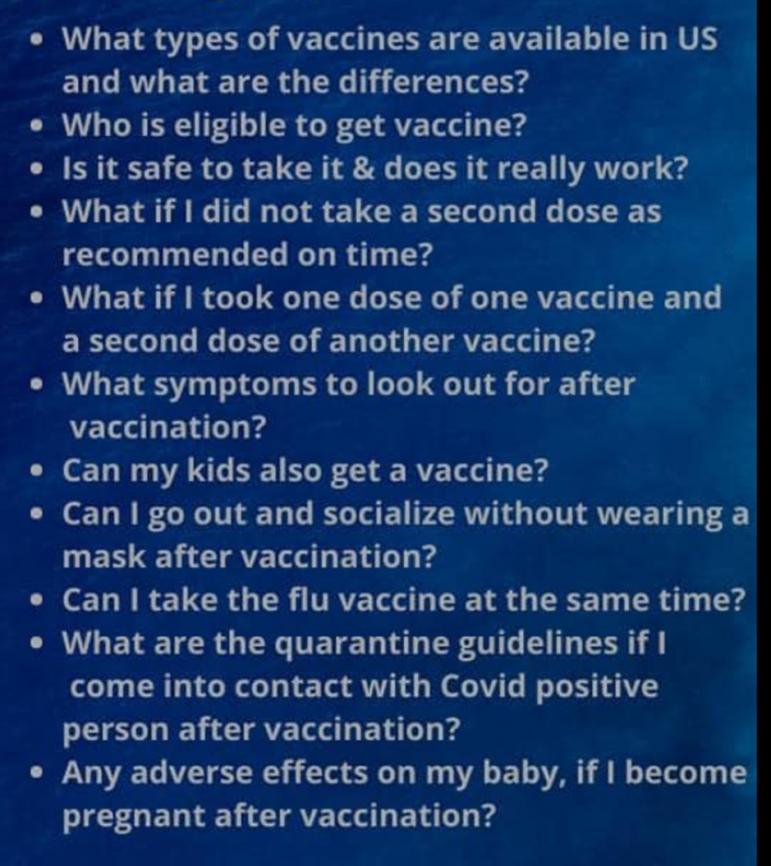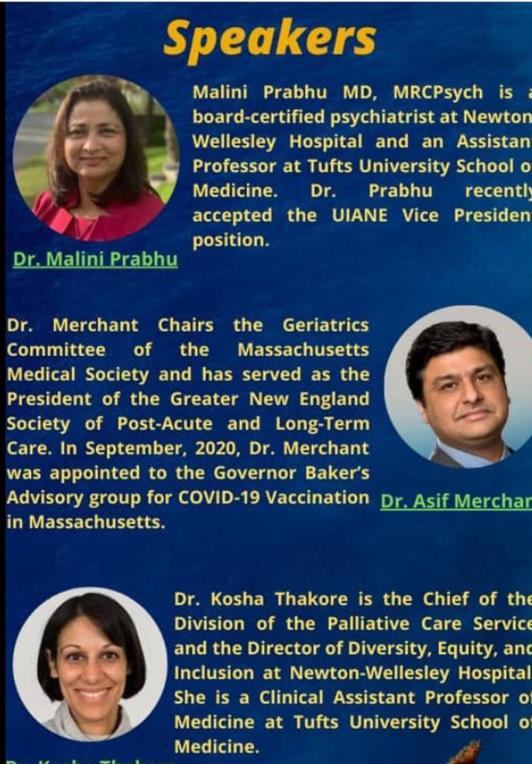Contribute
| COVID19 Vaccine: All You Need To Know |
Geetha Patil
02/08/2021
"COVID19 Vaccine: All You Need to Know," an informational webinar session was organized by the Indian Medical Association of New England (IMANE), United India Association of New England (UIANE), and India Association of Greater Boston (IAGB) on February 6, 2021 evening. They brought an interactive panel to help curb the misinformation that is spreading on social media and answer the participants' questions related to the COVID-19 vaccine. Hundreds of audiences participated in the program with much keenness to learn more about the COVID19 vaccination process. Ms. Aditi Soni, the president of UIANE, welcomed and thanked all the participants and the audiences for the webinar program. Dr. Malini Prabhu, a psychiatrist at Newton Wellesley Hospital, Assistant Professor at Tufts University School of Medicine and the UIANE Vice President, Dr. Asif Merchant, chairs the Geriatrics Committee of the Massachusetts Medical Society, President of the Greater New England Society of Post-Acute and Long-Term Care and recently appointed to the Governor baker's Advisory group for COVID-19 Vaccination in Massachusetts and Dr. Kosha Thakore, the chief of the Division of the Palliative Care Services and the Director of Diversity, Equity, and Inclusion at Newton-Wellesley Hospital, and Assistant Clinical Professor at Tufts University School of Medicine were the notable speakers. They educated the participants about the importance of vaccination and its process. Dr. Prabhu started the session with a PowerPoint presentation of crucial information on vaccines. Dr. Prabhu said that the Pfizer/BioNTech and Moderna vaccines are genetically modified mRNA vaccines that use the body's immune cells to produce critical viral protein antibodies and do not contain animal products such as eggs, preservatives, or latex and given to the American people at no cost. Two specified doses of each authorized vaccine will be given at specified intervals: the interval is 21 days between the first and second dose for the Pfizer-BioNTech COVID-19 vaccine, and for the Moderna COVID-19 vaccine, the interval is 28 days between the first and second dose. The U.S. Food and Drug Administration (FDA) has granted Emergency Use Authorizations for these vaccines after showing to meet rigorous safety criteria and be effective. At the same time, CDC also watches safety issues across the entire country. She further said that an individual who's been vaccinated can still be infected with coronavirus and may become symptomatic. Quarantining and the state specified guidelines should be followed despite vaccination. The efficacy rates for both vaccines is that of approximately 94%. People who get the vaccine develop an immune response against the coronavirus and may experience a milder form of illness if they get infected. The vaccine shots may cause sore arms, swelling, mild fever, fatigue, and body aches, which are temporary but not dangerous side effects. Dr. Prabhu educated the audience on the importance of herd immunity in controlling the spread of the infection. When asked about the concerns of people who are pregnant, breast-feeding, and part of a group ( phase 1,2 or 3)recommended receiving the COVID-19 vaccine and said that they might consider having counseling with their health care provider Dr. Asif merchant said that throughout the next several weeks, the multilingual including American Sign Language (ASL) public awareness effort will affect a variety of platforms such as TV, radio, print, social media, and search ads in all languages. The campaign will continue to direct residents to www.mass.gov/COVIDvaccine. A new announcement included establishing a call center to help residents 75 and older more easily schedule an appointment if they do not have internet or are unable to use the website, which will be open Monday through Friday from 8:30 AM – 5:00 PM in more than 100 languages. The line can be accessed by dialing 2–1–1 and selecting the prompt for "Help Scheduling a Vaccine Appointment." The caller may have to wait on the line given the expected high call volume. The goal is to vaccinate everyone when large quantities are available for distribution by following CDC's recommendations and our plan to prioritize, distribute, and allocate vaccine. Dr. Thakore spoke Serious problems from vaccination can occur, but they are rare. In between different vaccines such as COVID-19 or flu, wait at least 14 days before getting the other vaccine. Vaccination can be given to all adults of any age except with certain underlying medical conditions because they are at increased risk. If anyone having a severe allergic reaction after leaving the vaccination site, seek immediate medical care by calling 911. V-safe is a new smartphone-based application that can follow up to anyone who reports medically significant (important) adverse events after the vaccination. It can be used to set up second vaccine dose reminders. Healthcare providers will be required to report certain adverse events following vaccination to VAERS (Vaccine Adverse Event Reporting System). The takeaway from the educational session was to register at the www.mass.gov/COVIDvaccine website and wait for our turn to be vaccinated and follow social distancing, wash hands, and wearing of the mask even after vaccinated.

You may also access this article through our web-site http://www.lokvani.com/

